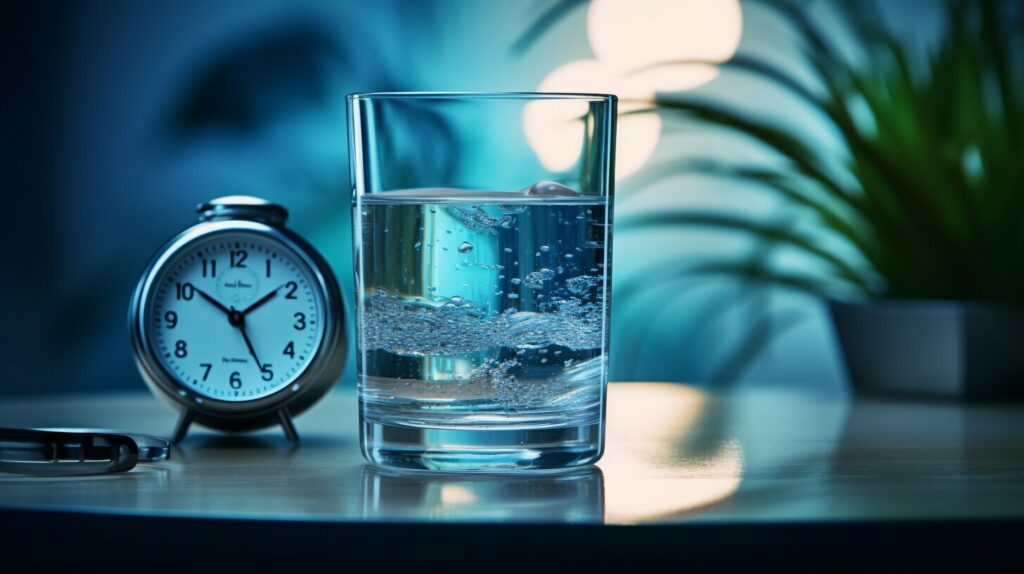Fasting before a blood test is common practice to ensure accurate results. While you need to abstain from consuming food and some beverages, the question remains: can you drink water before a fasting blood test? According to healthcare experts from reputable sources, including family medicine specialist Timothy Tramontana, MD, MS, and experts at PharmEasy and Quest Diagnostics, it is generally acceptable to drink water before a fasting blood test. However, it is important to only drink plain water and avoid flavored or carbonated water, as well as teas and other beverages. Drinking enough water to stay hydrated is crucial, but be cautious about the timing to ensure accurate results.
Key Takeaways:
- Drinking water is generally allowed before a fasting blood test.
- Avoid flavored or carbonated water, as well as teas and other beverages.
- Timing is key to minimize any potential impact on the test results.
- Staying hydrated helps plump veins, making it easier to draw blood.
- Communicate any medications or supplements to your doctor for accurate results.
Understanding Fasting Blood Tests and Preparation
When it comes to fasting blood tests, it is important to understand the guidelines and prepare accordingly. These tests, including the basic metabolic panel, blood glucose test, cholesterol test, liver function test, and renal function panel, typically require fasting for a period of 8 to 12 hours. Scheduling the test in the morning after fasting overnight is recommended.
Staying hydrated before a fasting blood test is crucial, and drinking water is generally allowed. However, it is important to avoid beverages that may interfere with the test results. This includes flavored or carbonated water, as well as teas and other non-plain water options. It is best to stick to plain water to ensure accurate results.
Hydration before a fasting blood test serves multiple purposes. It helps plump the veins, making it easier to draw blood, and it also helps the body function optimally during the fasting period. Drinking sufficient water prior to the test is advisable, but timing is key to minimize any potential impact on the test results. It is important to follow the guidelines provided by your healthcare provider and communicate any concerns or questions you may have.

Importance of Staying Hydrated Before Fasting Blood Work
Staying hydrated before a fasting blood test is essential for optimal test results. It helps ensure accurate readings and prevents any complications that may arise from dehydration. When the body is dehydrated, it can affect blood volume and concentration, potentially leading to skewed test results.
Drinking enough water before a fasting blood test helps maintain the body’s hydration levels and ensures that the blood sample is representative of your true health status. – Dr. Timothy Tramontana
In addition to drinking water, it is important to avoid beverages that contain caffeine or act as diuretics, as they can affect the accuracy of the test results. Caffeine can stimulate the production of certain hormones and alter blood glucose levels, which can impact the interpretation of the test. Therefore, it is best to refrain from consuming coffee, tea, or any other caffeinated beverages before the fasting blood test.
Medications and Fasting Blood Tests
When it comes to fasting blood tests, it is essential to communicate with your healthcare provider about any medications or supplements you are taking. In general, most daily medications, including blood thinners and blood pressure medications, can be taken as usual before a fasting blood test unless advised otherwise by your doctor. Over-the-counter medications like pain relievers, such as ibuprofen, are typically acceptable. However, it is important to disclose all medications and supplements to your doctor to avoid any potential interference with the test results. It is also important to note that while drinking water is generally allowed before a fasting blood test, other beverages, including coffee, should be avoided until after the test.
During the fasting period, it is important to follow your healthcare provider’s instructions regarding medication intake. Some medications may need to be temporarily discontinued before the test to provide accurate results. Your doctor will determine if any adjustments are necessary based on your specific medical history and the type of fasting blood test being conducted.
In certain situations, your healthcare provider may recommend specific fasting instructions, such as adjusting medication timing or dosage. These recommendations are made to ensure the accuracy of the test results and to avoid any potential complications or interactions between medications and the fasting requirements. It is crucial to follow these instructions carefully to obtain reliable blood test results.
| Common Medications | Impact on Fasting Blood Tests |
|---|---|
| Blood Thinners (e.g., Warfarin, Aspirin) | Usually allowed, but may need temporary discontinuation depending on the specific test and your doctor’s instructions |
| Blood Pressure Medications (e.g., ACE inhibitors, Beta-blockers) | Usually allowed, but check with your doctor for specific instructions |
| Pain Relievers (e.g., Ibuprofen, Acetaminophen) | Typically acceptable, but disclose all medications to your doctor |
| Diabetic Medications (e.g., Insulin, Metformin) | May require adjustments in timing or dosage, consult your doctor for guidance |
It is crucial to inform your healthcare provider about any changes in your medication regimen or any new medications you are taking. This allows your doctor to make informed decisions about your fasting blood test and ensure accurate results. Remember, your healthcare provider is the best source of information and guidance when it comes to fasting instructions and medication management before a blood test.
What If You Forgot to Fast?
If you accidentally consumed food or beverages before a fasting blood test, it is recommended to inform your doctor or healthcare provider. In some cases, if the results come back normal, there may not be a need to redo the bloodwork. However, if the results are abnormal, your doctor may advise you to repeat the test while fasting to ensure accurate results.
If the results are abnormal, your doctor may advise you to repeat the test while fasting to ensure accurate results.
If you have any concerns or questions about fasting and the impact it may have on your blood test results, it is best to reach out to your primary care team for guidance.
Can You Drink Water Before a Fasting Blood Test?
The question of whether you can drink water before a fasting blood test often arises. According to reputable sources, including family medicine specialist Timothy Tramontana, MD, MS, and experts at PharmEasy and Quest Diagnostics, it is generally acceptable to drink water before a fasting blood test.
However, it is important to remember that only plain water should be consumed. Flavored or carbonated water, as well as teas and other beverages, should be avoided. The goal is to stay hydrated, but the timing of water intake should be carefully considered to ensure accurate test results.
If you accidentally consumed food or beverages before a fasting blood test, it is best to inform your doctor or healthcare provider. They will be able to provide guidance based on your individual situation and may advise whether the test needs to be repeated while fasting. Remember to follow the guidelines provided by your healthcare provider to ensure accurate results for your fasting blood test.
Conclusion
Preparing for a fasting blood test requires careful consideration and adherence to specific guidelines. While water intake is generally allowed before the test, it is important to avoid certain beverages that may interfere with the results. Staying hydrated is crucial for a successful blood draw, as it helps plump veins and makes the process easier.
To ensure accurate results, it is essential to communicate any medications or supplements you are taking to your healthcare provider. Most daily medications can be taken as usual, but it is important to disclose them to avoid any potential interference. Remember to avoid beverages like coffee that contain caffeine until after the test.
If you accidentally consume food or beverages before the test, it is recommended to inform your doctor. Depending on the results, they may advise you to repeat the test while fasting to ensure accuracy. Your primary care team is the best source of guidance for any concerns or questions you may have.
By following the prescribed guidelines, staying hydrated, and communicating with your doctor, you can properly prepare for your fasting blood test and ensure accurate results. Remember, staying informed and taking the necessary precautions are key to a successful testing experience.
FAQ
Can I drink water before a fasting blood test?
Yes, it is generally acceptable to drink plain water before a fasting blood test. However, it is important to avoid flavored or carbonated water, as well as teas and other beverages.
Which blood tests typically require fasting?
Blood tests that typically require fasting include the basic metabolic panel, blood glucose test, cholesterol test, liver function test, and renal function panel.
How long do I need to fast for a blood test?
Fasting for these tests typically ranges from 8 to 12 hours. It is recommended to schedule the blood test in the morning after fasting overnight.
Can I drink coffee or other caffeinated beverages before a fasting blood test?
No, it is important to avoid beverages like coffee and teas that contain caffeine, as they can affect the results of the blood test.
What should I do if I accidentally consumed food or beverages before a fasting blood test?
It is recommended to inform your doctor or healthcare provider. In some cases, if the results come back normal, there may not be a need to redo the bloodwork. However, if the results are abnormal, your doctor may advise you to repeat the test while fasting.
Is it important to disclose all medications and supplements to my doctor before a fasting blood test?
Yes, it is essential to communicate with your healthcare provider about any medications or supplements you are taking to avoid any potential interference with the test results.
Can I drink water during the fasting period before a blood test?
Yes, drinking water is generally allowed before a fasting blood test. Staying hydrated is important, but be cautious about the timing to ensure accurate results.
What happens if I don’t fast before a blood test?
Fasting before a blood test is important to ensure accurate results for certain tests. If you don’t fast as instructed, your doctor may advise you to repeat the test while fasting.
How does staying hydrated before a fasting blood test help?
Staying hydrated before a fasting blood test can help plump veins, making it easier to draw blood. Drinking sufficient water prior to the test is advisable, but timing is key to minimize any potential impact on the test results.
Should I take my daily medications before a fasting blood test?
In general, most daily medications, including blood thinners and blood pressure medications, can be taken as usual before a fasting blood test unless advised otherwise by your doctor. However, it is important to disclose all medications and supplements to your doctor.




